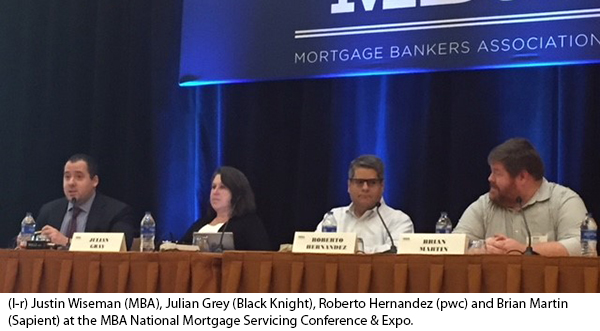
It’s Not Your Father’s Tech Anymore
DALLAS–Blockchain. Big Data. Fintech. Predictive Analytics. Artificial Intelligence. Whatever you might call it and however you might use it, technology is (finally) transforming the mortgage servicing industry.
“We are starting to experience a very interesting transition in the servicing industry,” said Roberto Hernandez, Principal and Consumer Finance Group Partner with PwC, Dallas, at the MBA National Mortgage Servicing Conference & Expo. “In an era of digital business and technology change, no company can ignore the imperative to innovate. Failing to do so is an invitation to lose business.”
 The transformation is taking place in the C-Suite as well, Hernandez said. “We’re finding that top executives are saying to those who want to innovate, to show them how it will work and how it will impact the bottom line,” he said.
The transformation is taking place in the C-Suite as well, Hernandez said. “We’re finding that top executives are saying to those who want to innovate, to show them how it will work and how it will impact the bottom line,” he said.
Easier said than done, however. A pwc survey found that roughly 25 percent of companies see themselves as innovation leaders. But the survey also reported more than half of those “innovating” companies struggle to bridge the gap between an innovation strategy and a business strategy.
Hernandez said companies must craft a strategy to win the game of digital disruption. “It’s the only way to survive the wave that is washing over our industry,” he said. “At the end of the day, if you create a receptive culture, you can overcome the obstacles.”
Some of the technology being used has its roots at the beginning of the century–blockchain, for example. Blockchain is a continuously growing list of records, called blocks, which are linked and secured using cryptography. Each block typically contains a cryptographic hash of the previous block, a timestamp and transaction data. By design, a blockchain is inherently resistant to modification of the data.
Blockchain technology, said Brian Martin, Director with Sapient Global Markets, Boston, is “pretty cool.” But he said it should be used intelligently.
“There is no better industry suited for blockchain than mortgage servicing,” Martin said. “At this point it is conceivable that the entire mortgage servicing industry could be replaced by blockchain.”
For example, blockchain avoids data re-entry and inconsistency, “which is incredibly valuable in an industry that has numerous data points,” Martin said. “Intelligent automations is capable of handling through rules and predictive/prescriptive analytics, knowing when and how to resolve missed payments, hardship scenarios and even consider the impacts or proactively suggest loan modifications.”
To get to blockchain, said Julian Grey, Mortgage Market Leader with Black Knight Inc., Jacksonville, Fla., predictive analytics must be deployed. And that starts with raw data.
“When we put refined data on top of raw data, it becomes more usable,” Grey said. Refined data begats reports, which begat ad hoc reports, query and drill and alerts and triggers and generates statistics. “This is the genesis of business intelligence,” she said. “Statistics are the gateway drug of business intelligence.”
With business intelligence, Grey said, companies can create forecasts and predict trends, earnings–anything a business needs to survive and optimize. “We go from ‘why did it happen’ to ‘how can we make it happen,'” she said.
Business intelligence is becoming more ubiquitous in the mortgage servicing space. “More importantly, it’s becoming increasingly accessible to smaller players in the industry,” Grey said.
For example, in 2016 many servicers realized that they weren’t retaining their servicing portfolios. “You can take the portfolio, risk-rank it and do a cost-benefit analysis to create actionable items for each loan in the portfolio,” Grey said. “That’s a pretty groovy way of analyzing data.”
“Take this as a wake-up call,” Martin said. “The work that I’ve seen out of start-ups and tech companies are mind-blowing…banks can study your online behavior and predict what you are going to by next; imagine how you can use the technology to change behavior so that their customers enjoy the mortgage experience–and make their monthly payment.”
